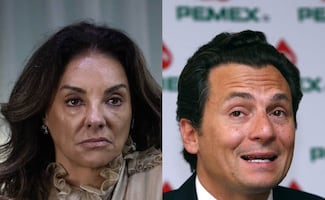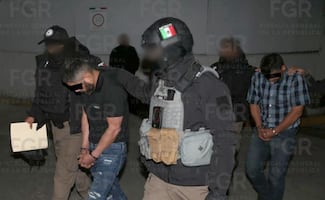Más Información

Seguridad de Chiapas se abre a indagatoria por narconómina dada a conocer por EL UNIVERSAL; “no tenemos nada que ocultar”, dice secretario

Corte va por dar cierre a disputa Lourdes Mendoza-Lozoya; “que no se convierta en símbolo de la impunidad”, pide la periodista

Gobernador de Chiapas anuncia investigación a elementos de unidad policial tras presuntos pagos del CJNG; hecho fue revelado por EL UNIVERSAL
Vicente Fox won the presidency with few ideas on how to address the dealings that the Mexican government had with Mexican cartels for over fifty years.
He could keep the agreements with the main drug lords untouched or "divorce" formal institutions from criminal power. In the beginning he chose the worst option: ignoring the problem.
This negligence had consequences. Between July and December 2000, the different cartels fought over markets and territories. Without a referee, the clashes became rough, and the Sinaloa Cartel decided to enter territories previously controlled by the Gulf Cartel, that responded by doing the same.
On January 19, 2011 Joaquín Guzmán was released from the Puente Grande prison to help "organize" his former allies.
His release was presented as an extraordinary escape. Authorities said that the drug lord fled prison in a laundry cart.
Over time the mistake became evident. Judging by the rise in violence that followed, it became evident that the Chapo was not an efficient mediator between the government and criminal groups.
He could not achieve a peace pact among cartels such as Tijuana, Juárez, Gulf, Zeta, Sinaloa, Beltrán Leyva, Valencia or La Familia Michoacana.
On the contrary, violence reached record levels with over 100,000 dead and 40,000 missing people.
The government became a responsible actor in this incident when it decided to fight almost all cartels except the one headed by Joaquín Guzmán. With this decision, they avoided the institutional rage of the Valencia brothers, leaders of the Jalisco New Generation cartel (CJNG).
The assistants of Felipe Calderón used to justify their actions by saying that it was necessary to fight the most violent criminals first.
Once the Institutional Revolutionary Party returned to power, Guzmán was rearrested in February 2014. People in Mazatlán say that most of the agents that participated in his capture were blond, tall and spoke English.
Hours after El Chapo was arrested, the U.S. government requested his extradition. But Mexico did not want Guzmán to leave the country. Maybe he knows something that could cause a devastating political storm.
Over the last year the CJNG has gained a lot of territory. And in May it showed its superiority over any other competitor, including the Mexican government.
The CJNG now operates in areas that used to be controlled by the Sinaloa cartel, and unlike its predecessors, it does not seem to be willing to make political compromises.
In this context Joaquín Guzmán was released for the second time. Unsurprisingly, the story of the free agent was repeated.
There is an alternative version given by Monte Alejandro Rubido: a small hole on the shower area connected to a mile long tunnel.
Readers should decide which version sounds more plausible: a government operator or the remake of an extraordinary escape.
____________________________________________________
About the author
Ricardo Raphael is a columnist for El Universal. Journalist, teacher and writer. Coordinator of the journalism master's degree at the Center for Research and Teaching in Economics (CIDE). Presenter of Espiral, a TV show about public policies broadcast by Channel 11.
Noticias según tus intereses
[Publicidad]
[Publicidad]











